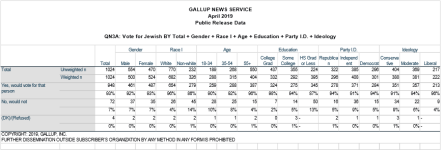Koyaanisqatsi
Veteran Member
You can't know for sure whether or not Bernie can beat Trump or not.
"Know for sure"? What does that even mean and where did I claim absolute surety? I said it was clear and non-controversial. Non-controversial in this context means not unexpected.
Once again, for anyone who actually understands American politics, the fact that he is Jewish--and comes across as a "New York Jew" in particular--is a serious problem across ALL demographics, regardless of party affiliation and that's just right out of the gate, not accounting for his policy proposals. That means that there is going to be--not might be, but already exists--a certain percentage of Democrats that will simply not vote for him. That does not necessarily translate into voting for Trump, but it has the same effect. This is precisely why Putin targeted primarily minorities in order to suppress their vote.
Here is a comprehensive Gallup poll that breaks it all down. In regard to voting for a Jewish candidate, you'll see that the total is a seemingly impressive 93%, up 2 points since 2015.
Dig a little deeper and you find this:

Among women, 35% would not vote for a Jew; "non-white" is 45%; low education 50%; Indies 36%; conservative (which can apply to Dems as well) 34% and moderates (also applicable to Dems) 22%, for a total of 56% among those who identify as conservative and/or moderate. Worse is that, by age, the larger amount who would not skew younger (with 28% among 18-34).
What's more, here is the breakdown of those polled:
For results based on the sample of –530—national adults in Form A and the sample of – 494 – national adults in Form B, the margin of sampling error is ±5 percentage points.
For results based on the sample of –443—Democrats and Democratic-leaning independents, the margin of sampling error is ±6 percentage points.
That'a a helluva margin of error and means that, overall, it could be 99% total are in favor OR it could mean only 87% are in favor. If you applied that sampling error to the demographic breakdowns, it becomes even more problematic. For example, it could mean it's really a total of 49% (or nearly half) of "non-white" voters.
Assuming some of those who identify as "non-white" are Republicans, we can separate out about 20%, which leaves a rough 30% of non-white Democrats that may just not bother to vote if Sanders is the front runner. That would be all Trump would need to win (and not just the technical EC, but the popular vote).
Regardless, even if those percentages resulted in much smaller non-voters--let's say it's JUST 2% per demographic--then we're talking about 2% of women; 2% of blacks; 2% of Hispanics for a total of 6% of Democrats simply not voting because Sanders is Jewish. And no other reason.
Again, in the last race, Trump was made POTUS due to a less than 1% voting differential and that primarily driven by a 4% suppression among blacks.
6% suppression just because he's Jewish--setting aside his more radical "socialist" policy agenda--would be devastating.
Hence, why, once again, among people who understand American politics, it is both clear and non-controversial to state that he can't beat Trump.
People thought Trump could not beat Hillary and look at her now.
Once again, he could NOT beat Hillary. He lost to her by almost three million votes (and nearly ten million total, when you account for expressed preferences among those who intended to vote, but for various non-partisan reasons did not end up casting their ballots).
Do you not understand what a popular vote measures? It's right there in the title.

